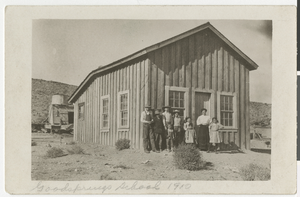Search the Special Collections and Archives Portal
Search Results
Educational Equity Resource Center Records
Identifier
Abstract
The Educational Equity Resource Center (EERC) records contain material from workshops hosted by the EERC throughout Southern Nevada, especially Las Vegas, Nevada, between 1973 and 2000. The EERC aimed to provide teachers, students, and parents information on gender equity education, support, and training. Workshop materials include participant worksheets, surveys, brochures, instructional booklets, advertisements, correspondence, and evaluation forms. Workshop participants include K-12 students, postsecondary school students, educators, and parents. The records also include EERC organizational correspondence, reports, newsletters, publications, and resources detailing workshop and EERC funding, development, and promotion.
Archival Collection
Mark Coleman oral history interview
Identifier
Abstract
Oral history interview with Mark Coleman conducted by Margaret Grosbeck on April 24, 2007 for the Public School Principalship Oral History Project. In this interview, Coleman reflects on his career as a teacher and administrator with the Clark County School District from the 1980s to the early 2000s. He discusses his upbringing and entry into education, and his motivations to move from being a teacher to becoming an administrator. He then describes challenges that he faced as a dean, assistant principal, and principal at various high schools. He emphasizes his concerns for school safety and his responsibility as an administrator to keep students safe, in addition to pressures that he faced to foster meaningful relationships with staff, students, and their families.
Archival Collection

Transcript of interview with Judith L. Hamblin by Margaret Stambro, March 30, 1976
Date
Archival Collection
Description
On March 30, 1976, collector Margaret Stambro interviewed schoolteacher and registered medical stenographer, Judith L. Hamblin (born June 11, 1941 in Las Vegas, Nevada) in her home in Henderson, Nevada. This interview covers the history of Henderson, local schools and teachers, and Helldorado. Also during this interview, Mrs. Hamblin discusses her fondness for Lake Mead, the Basic Magnesium Plant, Nellis Air Force Base, and the early aboveground atomic blasts.
Text
Francie Summers oral history interview
Identifier
Abstract
Oral history interview with Francie Summers conducted by Stacia Luigi on October 14, 2009 for the Public School Principalship Oral History Project. In this interview, Summers reflects upon her 35-year career as a teacher and principal with Nevada’s Clark County School District (CCSD). She describes her experience teaching at different private and public schools, how she later became a principal, and how her philosophy of education changed throughout her career. She also provides her opinion on contemporary topics such as standardized testing, student ethics, No Child Left Behind, and teacher grievances.
Archival Collection
Susan Tsukamoto oral history interview
Identifier
Abstract
Oral history interview with Susan Tsukamoto conducted by Claudine Robinson on October 18, 2007 for the Public School Principalship Oral History Project. In this interview, Tsukamoto reflects upon her 33-year career as a teacher and administrator with Nevada’s Clark County School District (CCSD). Having returned to work after retiring, she notes trends and changes that she has witnessed with standardized testing, curriculum development, and programs such as No Child Left Behind. She also reflects upon her experience as a principal, her biggest accomplishments and challenges, and her working relationships with parents, teachers, and students.
Archival Collection
Charles Santelman oral history interview
Identifier
Abstract
Oral history interview with Charles Santelman conducted by Catrina J. First on November 17, 2002 for the Public School Principalship Oral History Project. In this interview, Santelman reflects upon his 36-year career as a teacher and administrator with Nevada’s Clark County School District (CCSD). He discusses his teaching experience in Sandy Valley, Nevada, and compares it to teaching in Las Vegas, Nevada. He also describes the process by which he became an administrator and his working relationship with teachers and parents, and offers suggestions for individuals interested in pursuing school administration.
Archival Collection
Janice Stromberg oral history interview
Identifier
Abstract
Oral history interview with Dr. Janice Stromberg conducted by Karen S. Laird on April 07, 2004 for the Public School Principalship Oral History Project. In this interview, Dr. Stromberg reflects upon her career as a teacher and administrator in Oregon and Nevada. She focuses on her experiences as a principal, her approach to school administration, and her working relationship with teachers and other administrators. She also describes some of her biggest responsibilities and challenges, her experience with school integration, and proposed changes that she would make within the education system.
Archival Collection

Postcard of school, Goodsprings (Nev.), 1910
Date
Archival Collection
Description
Image
Mario C. Monaco oral history interview
Identifier
Abstract
Oral history interview with Mario C. Monaco conducted by Carrie Regula on April 26, 2002 for the Public School Principalship Oral History Project. In this interview, Monaco reflects upon his career as a teacher and administrator with Nevada’s Clark County School District. He discusses his approach to school administration, and describes experiences that shaped that approach. He describes his regular responsibilities and challenges, programs that he implemented throughout his career, and his priority in establishing working relationships with students, staff, and parents.
Archival Collection
Dayle K. Rust oral history interview
Identifier
Abstract
Oral history interview with Dayle K. Rust conducted by Michelle Muniz on May 01, 2004 for the Public School Principalship Oral History Project. In this interview, Rust reflects upon his career as a teacher and administrator in Nevada’s White Pine County School District and Clark County School District. He describes the process by which he first became a teacher in the White Pine County School District, his experience as a coach, and legal challenges that he experienced with teacher dismissal. He then describes how he began working with the Clark County School District at J. D. Smith Middle School, and then was sent to work at various middle schools throughout the School District. He describes his experience as assistant principal of Gilbert Magnet School for Communications & Creative Arts, and discusses political challenges that led to his retirement.
Archival Collection
